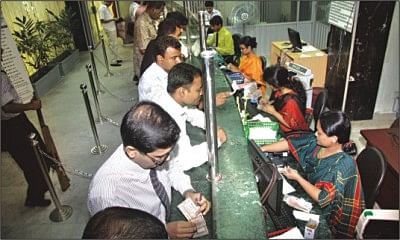BB's smart move

Customers queue at a local bank in Dhaka. Demand for the dollar fell in the last two years, but the value of the greenback was relatively stable.Photo: Amran Hossain
Demand for the dollar has marked a fall in the last two years mainly because of the impact of global recession on the country's external trade.
But the value of the greenback did not go much down, thanks to prudent interventions by Bangladesh Bank (BB) in the money market.
And exporters and remitters -- the two drivers of the economy -- did not feel much of the recession's pinch. They were the beneficiaries of the BB interventions.
The central bank has bought $1.77 billion from the market until May 11 of the current fiscal year against a sale of just $76.5 million.
Last fiscal year's buying was $1.48 billion, while the sale was less than $100 million.
Two years ago, in fiscal 2007-08, the trend was opposite. At that time the BB had bought only $202 million against a sale of $735 million to cool down the soaring market.
“It's all about a managed exchange rate, not floating,” said Monzur Hossain, research fellow of Bangladesh Institute of Development Studies (BIDS) and an expert on the exchange rate.
The researcher has questioned whether the BB move will sustain.
“So far, the foreign exchange management is all right. But it will not work when demand and inflation go up riding on the recovery from global recession,” Hossain said.
Bangladesh has adopted a floating exchange rate in 2003, meaning that demand and supply will determine the rate. But in reality, the central bank is intervening in the market, by selling and buying the foreign currency.
The dollar traded at Tk 69.37 for sale and the buying price was Tk 69.34 yesterday, according to BB data. But more than four years ago, in March 2006, the BDT-USD exchange rate had reached a peak of Tk 71.75 in the inter-bank foreign exchange market.
Central bank officials, including the governor, believed the dollar could have dropped further from the present level if they had not intervened in the market frequently for the last two years.
“Yes, we are intervening to keep the market stable,” BB Governor Atiur Rahman told The Daily Star. The price of the greenback could have fallen sharply if there had been no intervention, he said.
“The exporters and remitters were the biggest beneficiaries of the intervention,” said the governor defending the BB intervention.
An appreciated dollar against the taka will benefit exporters, remitters and foreign investors, but it may fuel inflation and import costs, the BB officials said.
The fluctuations in the foreign exchange rate not only affect the exporters and importers but also banks, foreign investments, remittances, inflation and balance of payments.
“We try to manage the rate prudently, to ensure the interests of all the stakeholders,” said a senior BB official.
On the frequent interventions in the foreign exchange market in the last two years, the official said it was necessary.
“The value of the dollar could have dropped further without the intervention,” said the official. There was low demand for the foreign currency during the past two years because of recession and a sharp decline in domestic and international trade, he said.
But the International Monetary Fund (IMF) in its country report published in February 2010 called for greater flexibility in the exchange rate to support the monetary policy goals.
"The authorities should move towards greater flexibility in the exchange rate to lessen the constraints on macroeconomic policies," the IMF said.
Monzur Hossain advised the BB to reduce the number of currencies to major three, instead of the present eight currencies, to determine the REER (real effective exchange rate).
The foreign exchange market is the largest and most liquid financial market in the world and any change in the market affects all the countries involved in international trade.
Daily turnover in the market was reported to be over $3.2 trillion in April 2007 by the Bank for International Settlements. Since then, the market has continued to grow. According to Euromoney's annual FX Poll, volumes grew a further 41 percent between 2007 and 2008.
[email protected]

 For all latest news, follow The Daily Star's Google News channel.
For all latest news, follow The Daily Star's Google News channel. 



Comments